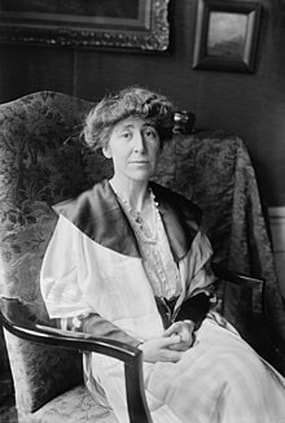Jeannette Rankin

Jeannette Rankin was born on June 11, 1880 in Montana. Growing up on her family farm sparked her drive for women's rights; she saw that even though women and men worked side by side on the farm, but their political voices were not equal and their legal right to vote was not equal. After graduating high school, she went to the University of Montana and got a Bachelor of Science in biology. Before she had a political or advocacy career, she did odd jobs and cared for her family.
After several years of miscellaneous jobs and education, Rankin joined the women's suffrage movement in Seattle, Washington. She became a professional lobbyist for the National American Woman Suffrage Association (NAWSA). She returned to Montana and rose through the ranks, eventually becoming the president of the Montana Women's Suffrage Association. With he speaking and organization efforts, she helped the women in the state of Montana gain the vote in 1914.
When Rankin decided to run for House of Representatives in 1916, she saw her work rallying for women's right to vote a a positive point in her campaign. She ran as a progressive and emphasized a support of suffrage, social welfare, and prohibition. Upon winning the seat in the House, she said, "I may be the first woman member of Congress, but I won't be the last." During her terms (1917-1919, 1941-1943), she was part of the Congress during both world wars. She was part of the minority voting against the war, hold a pacifist standpoint throughout her political career.
Her political and activism work has paved the way for women to climb the ranks in federal government and she played a large role in women being able to gain the right vote.
Check out the links below to read more information about Jeannette Rankin's story!
Details about her time in the House of Representatives
Wikipedia article about her life
After several years of miscellaneous jobs and education, Rankin joined the women's suffrage movement in Seattle, Washington. She became a professional lobbyist for the National American Woman Suffrage Association (NAWSA). She returned to Montana and rose through the ranks, eventually becoming the president of the Montana Women's Suffrage Association. With he speaking and organization efforts, she helped the women in the state of Montana gain the vote in 1914.
When Rankin decided to run for House of Representatives in 1916, she saw her work rallying for women's right to vote a a positive point in her campaign. She ran as a progressive and emphasized a support of suffrage, social welfare, and prohibition. Upon winning the seat in the House, she said, "I may be the first woman member of Congress, but I won't be the last." During her terms (1917-1919, 1941-1943), she was part of the Congress during both world wars. She was part of the minority voting against the war, hold a pacifist standpoint throughout her political career.
Her political and activism work has paved the way for women to climb the ranks in federal government and she played a large role in women being able to gain the right vote.
Check out the links below to read more information about Jeannette Rankin's story!
Details about her time in the House of Representatives
Wikipedia article about her life

